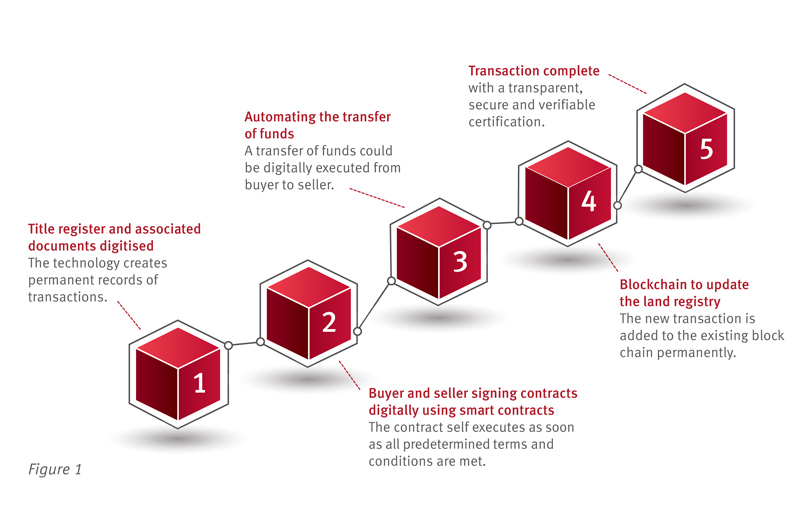The Digital Revolution of Real Estate Transactions
An important part of any real estate transaction is confirming and guaranteeing title. In Barbados the system is two tiered: a large portion of land registry is done manually and the rest is done by Registered Title. Technology today provides options for an innovative solution to inefficiencies experienced in real estate transactions. For example, a blockchain-based Land Registry. Imagine selling a house in one week versus 6 months, a reduction in legal fees due to a lighter work load for attorneys and greater ease in doing business given high degrees of automation and transparency. This can occur as this system would involve the buyer and seller signing smart contracts digitally, an automated transfer of funds and using blockchain to update the register. This results in the conveyancing process being more efficient for all parties. Despite its growing popularity, the term blockchain is not well understood, so we have ventured to break down the process for you.
Blockchain is a secure decentralised database that records digital transactions. Details of a transaction are encoded into a block and each block is connected to the previous block forming a chain.
What is Blockchain?
Blockchain is, in essence, a digital database (or ledger) distributed across a network of computers. The records are protected by cryptography and are therefore protected against human error, editing and removal. The versatility of blockchain means it is being widely considered as a way to manage financial transactions, asset transfers and regulatory obligations. In particular, blockchain is now seen by many as the future of land registration.
Security
Given that blockchain information is transparent and cannot be tampered with, the scope for property fraud is significantly reduced; this has become a growing concern for Land Registries globally. Each property can be uniquely coded and linked to a smart key that can be held only by the owner. Ownership of the property would be recorded resulting in secure identity verification of the seller.
Smart Contracts
Blockchain technology also underpins ‘smart contracts’. This saves time with lawyers and does not allow for any mistakes on the contract; once the information is confirmed in the system it cannot be changed, any template changes are spotted instantly. All due diligence is done online and the final financial transaction only occurs on block chain when all parties have agreed. For instance, property titles can be transferred to the purchaser automatically on receipt of funds into the vendor’s account thus speeding up the registration process. With the ledger updating immediately, the registration gap can be eliminated, which leads to greater efficiencies and cost savings. Another great feature is that everyone in the transaction can log in at any time and check on the status of the transaction.

Hopefully for Barbados, blockchain land registry is an area the government could be exploring in the near future. While Registration of Title has been done for new developments, total adaptation across the island has been slow. Other countries are making a start. In the UK for example, HM Land Registry plans to test a live ‘Digital Street’. This is part of the UK government’s commitment to make HM Land Registry the “world’s leading land registry for speed, simplicity and an open approach to data.” Figure 1 illustrates how efficient this new technology would be in the execution of a real estate transaction.
Data Protection Laws and Accuracy
Given the quantity of information that is stored on a land registry, blockchain systems need to comply with relevant data protection laws. As the technology develops, new laws will be required in order to continuously ensure proper regulation, especially in the areas of smart contract execution and electronic title transfers. A blockchain registry will only be as good as the data that is inputted – land registries will need to give careful consideration to accurate data entry processes and the resulting integrity of the blockchain. The time and cost of adopting blockchain technology to record land transactions will likely require a measured implementation by land registries to attain a fully operational blockchain registry. This will undoubtedly happen in Barbados but it comes down to government funding.
The Future
Blockchain technology is likely to be adopted by most countries that are seeking to attract external investment by making property ownership more reliable and secure. All parties in the Barbados real estate market will welcome more efficient real estate transactions with open arms. Smart contracts are the way forward given the ease of execution. For those countries with already well-established land registries, the potential cost savings and improved speed of transaction are enough to engage most if not all stakeholders.
According to a recent survey carried out by IBM, nine in ten governments say they plan to invest in blockchain technology to manage financial transactions, assets and contracts by next year. With the benefits on offer, it is hard to look past blockchain as the future of recording land transactions. The adoption however is inevitable.



